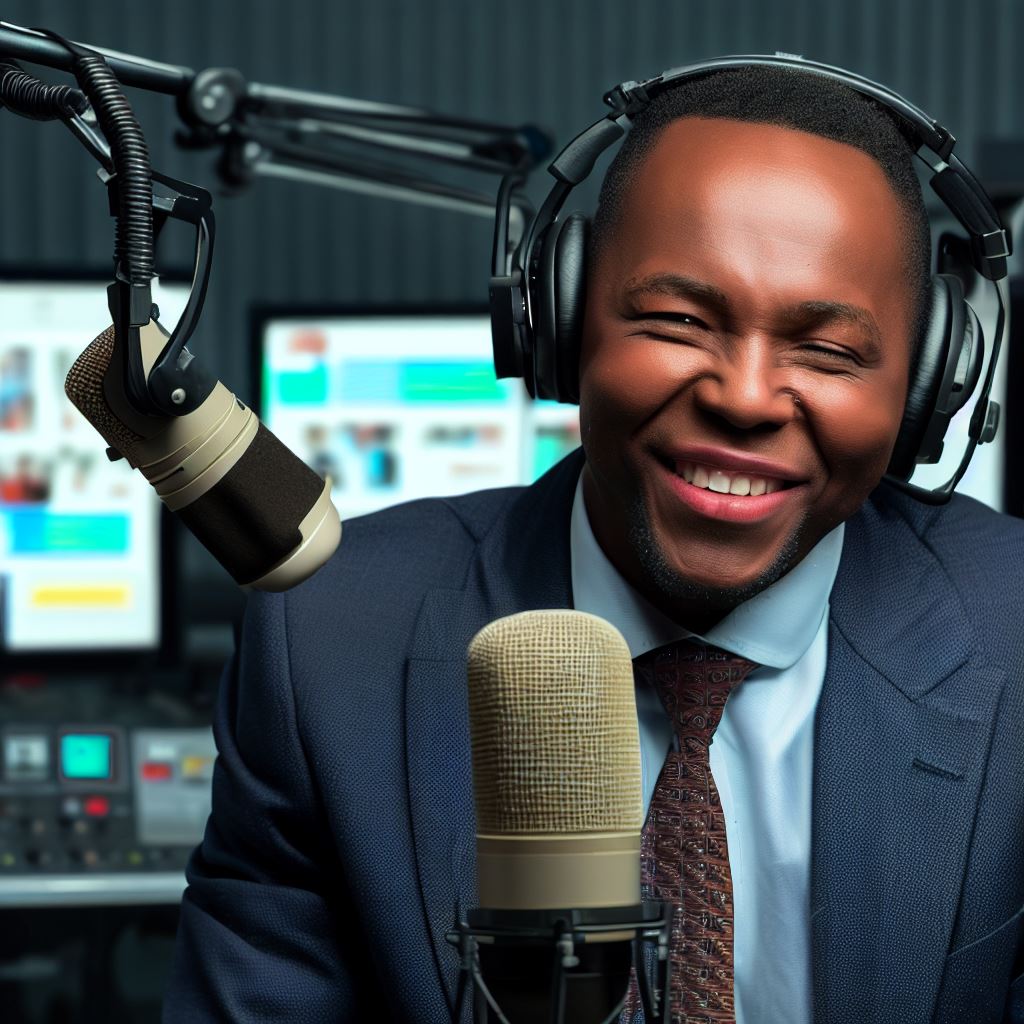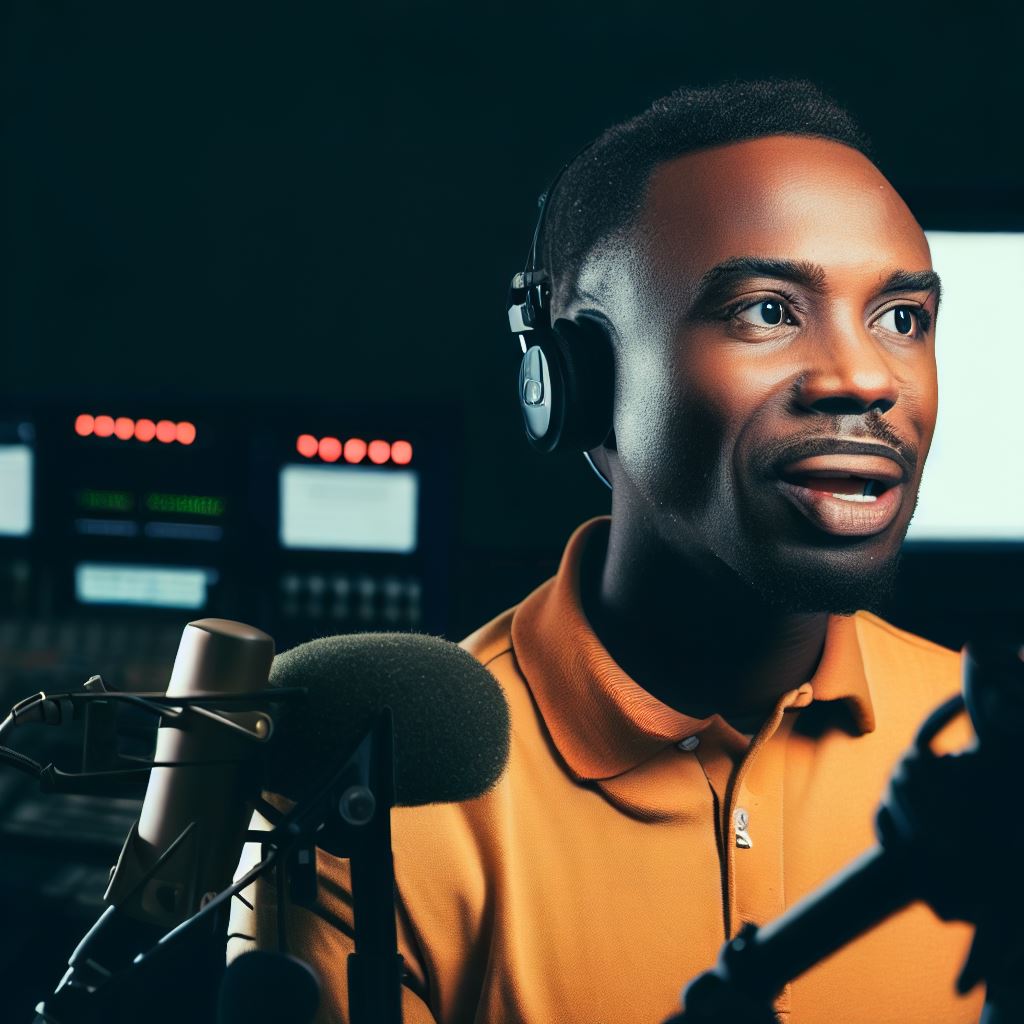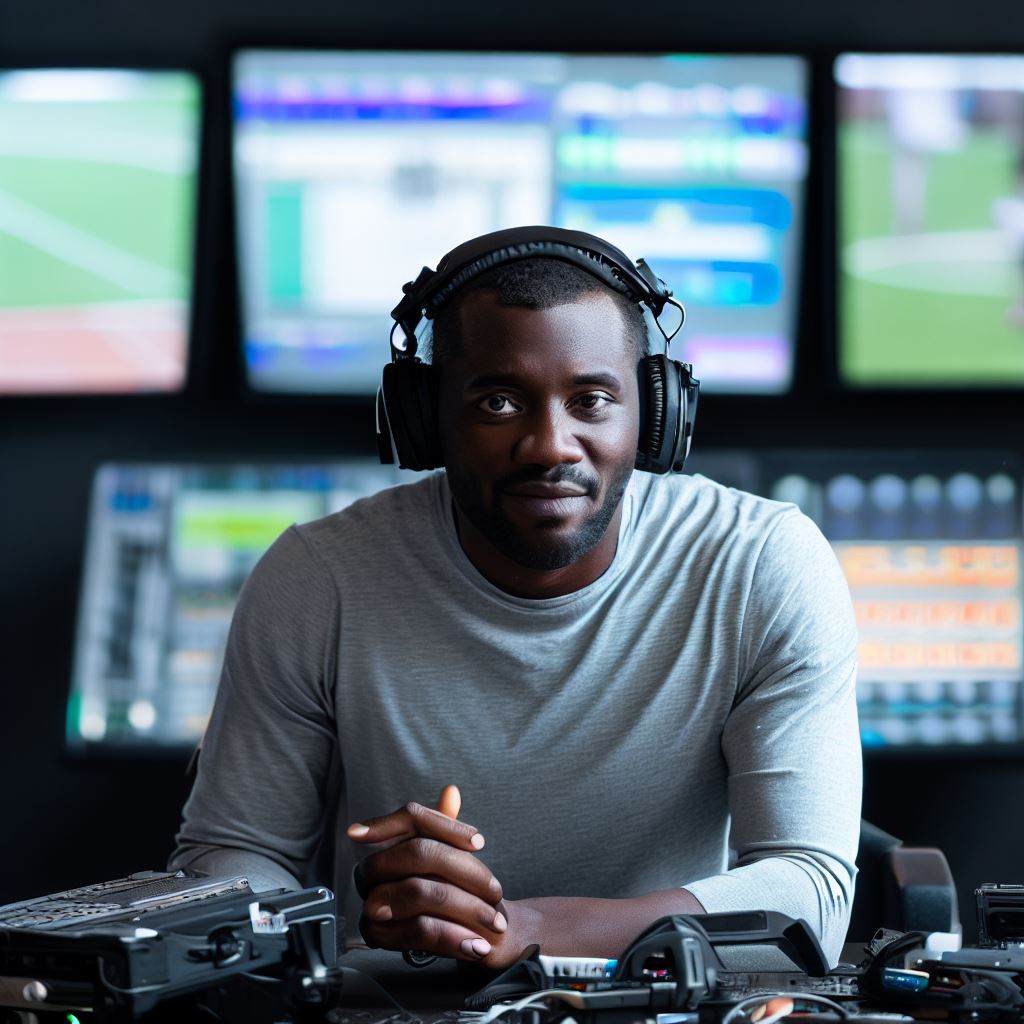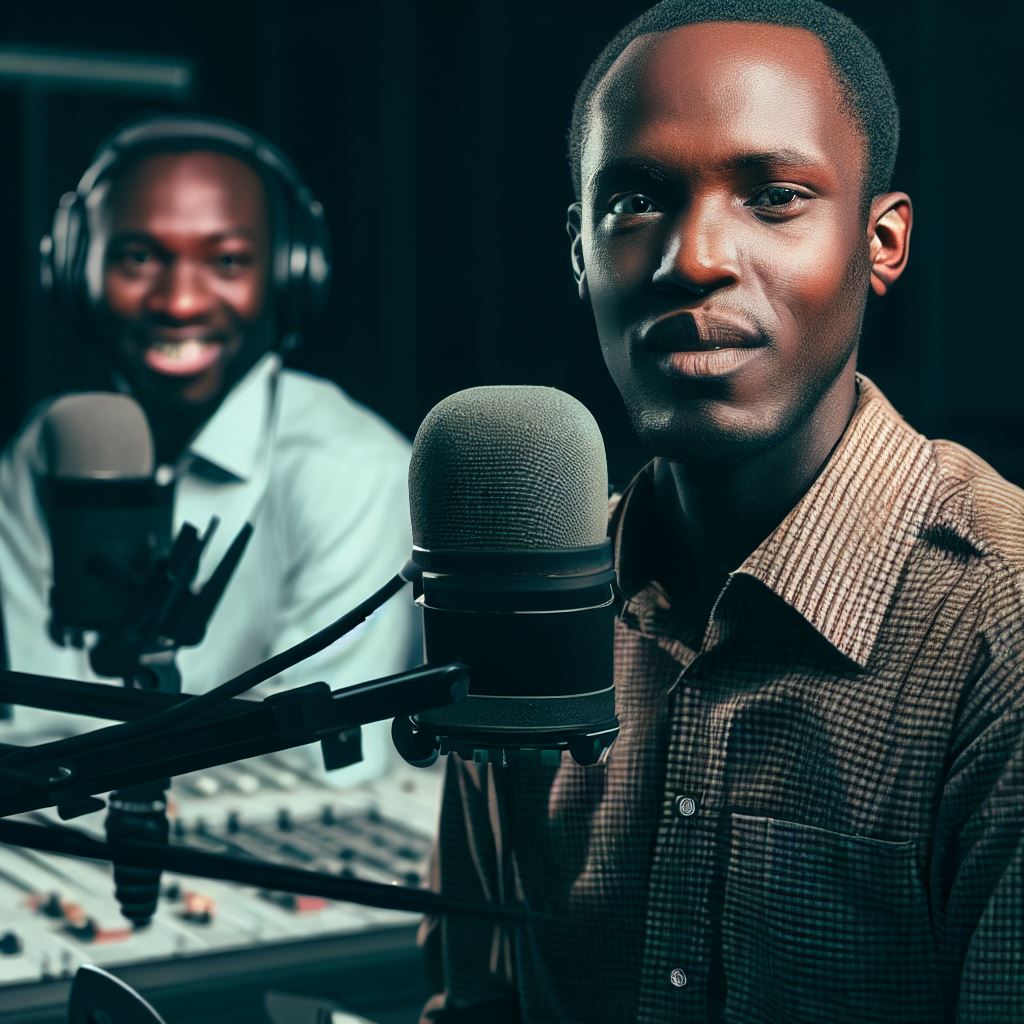Introduction
Let’s explore radio sports production in Nigeria: Legal aspects.
Radio sports production refers to the process of creating and broadcasting sports content on radio stations in Nigeria.
It plays a crucial role in engaging sports enthusiasts and promoting sports culture in the country.
Sports broadcasting in Nigeria has gained immense popularity over the years.
It provides a platform for fans to stay connected with their favorite sports, teams, and athletes.
Radio stations extensively cover a wide range of sports, including football, basketball, athletics, and more.
The significance of radio sports production lies in its ability to offer live commentary, analysis, and discussions on sports events.
It allows fans to experience the excitement and thrill of a game, even if they are unable to attend in person.
Furthermore, radio sports production serves as a reliable source of information regarding sports news, player interviews, and match schedules.
In Nigeria, radio sports production has become an integral part of the nation’s sports industry.
It promotes sports development, creates employment opportunities, and contributes to the overall growth of the economy.
Additionally, it helps in fostering a sense of unity and national pride among sports enthusiasts.
In the following blog sections, we will delve into the legal aspects of radio sports production in Nigeria.
We will explore the regulations, licenses, rights, and responsibilities involved in broadcasting sports content on radio stations.
Stay tuned for a comprehensive understanding of the legal framework governing radio sports production in Nigeria.
Legal Framework for Radio Sports Production in Nigeria
The legal framework governing radio sports production in Nigeria plays a crucial role in regulating the industry.
The Nigerian Broadcasting Commission (NBC) is the primary regulatory body responsible for overseeing radio broadcasting activities in the country.
A. Nigerian Broadcasting Commission (NBC) regulations
The NBC has established specific regulations that radio stations must adhere to when producing sports content.
These regulations cover various aspects, including licensing requirements, content guidelines, and advertising regulations.
To operate legally, radio stations must obtain the necessary licenses from the NBC.
These licenses ensure that stations meet certain standards and comply with broadcasting regulations.
Failure to obtain the required licenses can result in penalties or even the suspension of operations.
Content guidelines and restrictions imposed by the NBC aim to ensure that radio sports production maintains quality and adheres to ethical standards.
These guidelines cover issues such as hate speech, obscenity, and the protection of minors.
Radio stations must carefully adhere to these guidelines to avoid violating broadcasting regulations.
Advertising regulations for radio sports production involve restrictions on the types of advertisements that can be aired during sports programs.
These regulations aim to protect consumers and maintain the integrity of radio broadcasting.
Stations must comply with these regulations and ensure that advertisements meet the required standards.
B. Copyright laws and intellectual property rights
In addition to the NBC regulations, radio sports production in Nigeria is also subject to copyright laws and intellectual property rights.
Sports events broadcast rights, in particular, are highly valuable and are often secured through agreements with rights holders.
Radio stations must obtain the necessary licenses to broadcast sports events, or else they risk infringing on intellectual property rights and facing legal consequences.
Securing sports events broadcast rights presents challenges and implications for radio stations.
The cost of acquiring these rights can be substantial, especially for popular events.
Smaller radio stations may struggle to afford the fees, limiting their ability to provide extensive sports coverage to their audience.
C. Sports betting regulations
Sports betting regulations also impact radio sports production in Nigeria.
With the rise of sports betting platforms, radio stations need to navigate the legal landscape surrounding the advertising and promotion of these activities.
Restrictions may apply to the types of betting content that can be discussed on-air, as well as the endorsement of specific betting companies.
Compliance with sports betting regulations raises ethical concerns for radio stations.
They must ensure that their coverage of sports events and commentary remains unbiased and does not promote gambling excessively.
Transparency and responsible reporting are key considerations to maintain the integrity of radio sports production.
In short, the legal aspects of radio sports production in Nigeria are governed by the Nigerian Broadcasting Commission regulations, copyright laws, and intellectual property rights.
The NBC’s licensing requirements, content guidelines, and advertising regulations play a crucial role in ensuring quality and ethical broadcasting.
However, challenges arise regarding sports events broadcast rights and compliance with sports betting regulations.
Radio stations must navigate these legalities while upholding ethical standards to provide informative and engaging sports content to their listeners.
Read: Skills Needed for Radio Sports Production in Nigeria
Role of Radio Stations in Sports Production
A. Collaborations with sports governing bodies
Radio stations play a vital role in sports production in Nigeria.
Through collaborations with sports governing bodies, radio stations can enhance the coverage and quality of sports programming.
These collaborations often involve partnerships, sponsorships, and contracts, allowing radio stations to access exclusive content and establish a strong presence in the sports industry.
However, they also face challenges such as financial constraints and competition from other media outlets.
B. Radio rights negotiations and agreements
Radio rights negotiations and agreements are crucial in determining the extent of a radio station’s coverage.
These negotiations involve discussions on exclusive and non-exclusive rights to broadcast sporting events.
Exclusive rights provide radio stations with the sole authority to broadcast a particular event, boosting their market value, while non-exclusive rights allow multiple stations to cover the same event.
Financial considerations, such as licensing fees and advertising revenue potential, heavily influence these negotiations.
C. Broadcast content and production standards
Broadcast content and production standards are essential factors in creating compelling sports programming.
Commentary and analysis provided by knowledgeable sports presenters contribute to a better overall experience for the listeners.
Radio stations must also fulfill public interest obligations by regularly covering various sports and providing fair and unbiased coverage.
This ensures that listeners have access to a wide range of sports content and that all sporting events receive equal attention.
However, radio stations should maintain a careful balance between promoting radio rights and fulfilling their public service obligations.
While broadcasting rights are crucial for revenue generation, it is equally important for radio stations to prioritize the interests of the audience and the wider sports community.
By adhering to production standards and providing fair coverage, radio stations can maintain credibility and loyalty among their listeners.
In fact, radio stations have a significant role in sports production in Nigeria.
Collaborations with sports governing bodies allow them to access exclusive content, although they face challenges in terms of finance and competition.
Radio rights negotiations determine the extent of coverage, while content and production standards ensure the quality and credibility of broadcasts.
By fulfilling their obligations to the public and the sports community, radio stations can effectively contribute to the development and promotion of sports in Nigeria.
Read: Skills Needed for Radio Sports Production in Nigeria

Legal Challenges and Issues Faced by Radio Stations
Radio stations in Nigeria face significant challenges related to piracy and unauthorized rebroadcasting.
These issues pose a threat to their operations and revenue streams.
A. Piracy and unauthorized rebroadcasting
One of the key concerns for radio stations is protecting their intellectual property rights.
Radio sports productions involve the creation and broadcasting of original content, including live commentary, analysis, and interviews.
Protecting this content from piracy ensures that radio stations are able to maintain exclusivity and monetize their offerings.
To combat piracy, the Nigerian Broadcasting Commission (NBC) has implemented regulations that radio stations must adhere to.
These regulations aim to prevent unauthorized rebroadcasting of sports content without proper licensing or permission.
By enforcing licensing agreements, the NBC ensures that radio stations have the legal rights to broadcast specific sports events.
B. Defamation and player/club rights
Radio stations broadcasting sports content also face challenges related to defamation and player/club rights.
Balancing freedom of speech with legal obligations can be a delicate task.
Freedom of speech is a fundamental right, allowing individuals to express their opinions without censorship.
However, when it comes to sports broadcasting, radio stations need to be careful not to make defamatory statements about players, clubs, or other individuals involved in sports.
Any false or damaging statements made by radio stations can result in lawsuits and legal consequences.
Defamation claims can harm the reputation of players or clubs and may lead to financial damages.
Radio stations must be cautious in their reporting and ensure that the information they provide is accurate and fair.
C. Privacy and media rights
Privacy and media rights are important considerations in radio sports production.
Radio stations must protect personal data collected during sports broadcasting and ensure compliance with applicable privacy regulations.
Sports broadcasting often involves the collection and processing of personal data, such as players’ statistics, performance records, and other personal information.
Radio stations have a responsibility to handle this data with care and implement appropriate security measures to prevent unauthorized access or misuse.
Furthermore, radio stations may require consent and release forms from players, clubs, or individuals involved in sports before broadcasting interviews or any personal information.
These forms ensure that individuals are aware of how their information will be used and give their consent to its broadcast.
In essence, radio sports production in Nigeria faces legal challenges and issues, including piracy and unauthorized rebroadcasting, defamation and player/club rights, as well as privacy and media rights concerns.
Publish Your Professional Profile, Business or Brand
Showcase your expertise, gain trust, and boost visibility instantly on Professions.ng.
Publish NowRadio stations must navigate these challenges by protecting intellectual property, balancing freedom of speech, and upholding privacy regulations to ensure a legally compliant and ethical sports broadcasting environment.
Read: Radio Sports Producing: Nigeria’s Emerging Careers
Future of Radio Sports Production in Nigeria
A. Evolving technology and digital platforms
Evolving technology and digital platforms have greatly influenced the future of radio sports production in Nigeria.
Internet radio and streaming services have emerged as popular alternatives for sports broadcasting.
These platforms provide greater accessibility and convenience for both broadcasters and listeners.
Radio stations can now reach a global audience through internet radio and streaming services.
Digital platforms also offer new revenue opportunities through advertising and sponsorship deals.
B. Potential regulatory changes
The future of radio sports production in Nigeria may also be shaped by potential regulatory changes.
The National Broadcasting Commission (NBC) guidelines need to be updated for the digital era.
These guidelines should address issues related to internet radio and streaming services.
Regulatory changes can ensure a level playing field for both traditional and digital broadcasters.
Current legal gaps and challenges in radio sports production should be addressed through new regulations.
In general, the future of radio sports production in Nigeria is heavily influenced by evolving technology and digital platforms.
Internet radio and streaming services have provided new avenues for sports broadcasting, allowing radio stations to reach a global audience and tap into new revenue streams.
However, regulatory changes are necessary to ensure fair competition between traditional and digital broadcasters.
The National Broadcasting Commission should update its guidelines to address the challenges and opportunities presented by the digital era.
By bridging legal gaps and adapting to technological advancements, radio sports production in Nigeria can continue to thrive in the years to come.
Read: Salaries of Radio Sports Producers in Nigeria: Data
Find Out More: Radio Sports Producing: Nigeria’s Emerging Careers
Conclusion
Throughout this blog section, we have explored the legal aspects surrounding radio sports production in Nigeria.
We have highlighted the importance of understanding and abiding by the relevant regulations to ensure a smooth operation.
It is crucial for radio sports production entities in Nigeria to comply with the legal requirements set by regulatory bodies.
By doing so, they can avoid legal issues and maintain a favorable reputation in the industry.
While there are opportunities for growth and success in radio sports production in Nigeria, various challenges also exist.
These include intense competition, financial constraints, and the need to continually adapt to technological advancements while still remaining compliant with regulations.
In the end, radio sports production in Nigeria requires a thorough understanding of the legal framework and a commitment to adhere to the regulations.
By doing so, entities can leverage the potential opportunities while overcoming the challenges in the industry.




